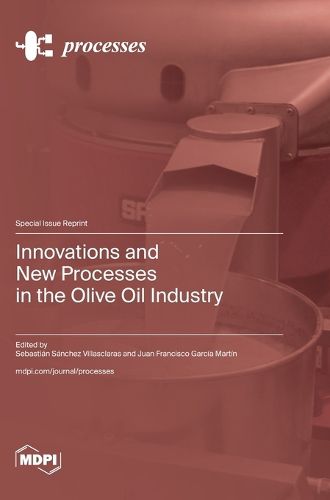Readings Newsletter
Become a Readings Member to make your shopping experience even easier.
Sign in or sign up for free!
You’re not far away from qualifying for FREE standard shipping within Australia
You’ve qualified for FREE standard shipping within Australia
The cart is loading…






This title is printed to order. This book may have been self-published. If so, we cannot guarantee the quality of the content. In the main most books will have gone through the editing process however some may not. We therefore suggest that you be aware of this before ordering this book. If in doubt check either the author or publisher’s details as we are unable to accept any returns unless they are faulty. Please contact us if you have any questions.
The olive oil industry, one of the largest industries in the Mediterranean basin and in other countries around the world, is fundamentally composed of olive groves, olive oil mills, pomace oil extraction plants, and oil refineries. Additionally, there are other types of closely related industries, such as those producing table olives and margarine and industries based on physicochemical transformation to obtain high-value-added products for the pharmaceutical, cosmetic, nutritional, and dietary sectors.Innovative processes and new technologies have been implemented in olive oil mills, oil refineries, and transformation industries in the last decade to improve the olive oil extraction and its quality, as well as to minimise and valorise the generated wastes. In this sense, biofuels (bioethanol, biodiesel, biogas, synthetic gas, etc.) and high-value-added products (tyrosol, hydroxytyrosol, squalene, oleuropein, tocopherols, and others) can be obtained from byproducts and residues from the olive oil and pomace oil extraction processes.This Special Issue, "Innovations and New Processes in the Olive Oil Industry", brings together 11 high-quality research studies addressing challenges faced in the olive oil industry and related industries, along with comprehensive overviews and in-depth technical research papers addressing recent progress in olive oil and table olive production and the management of different olive oil industry wastes.
$9.00 standard shipping within Australia
FREE standard shipping within Australia for orders over $100.00
Express & International shipping calculated at checkout
This title is printed to order. This book may have been self-published. If so, we cannot guarantee the quality of the content. In the main most books will have gone through the editing process however some may not. We therefore suggest that you be aware of this before ordering this book. If in doubt check either the author or publisher’s details as we are unable to accept any returns unless they are faulty. Please contact us if you have any questions.
The olive oil industry, one of the largest industries in the Mediterranean basin and in other countries around the world, is fundamentally composed of olive groves, olive oil mills, pomace oil extraction plants, and oil refineries. Additionally, there are other types of closely related industries, such as those producing table olives and margarine and industries based on physicochemical transformation to obtain high-value-added products for the pharmaceutical, cosmetic, nutritional, and dietary sectors.Innovative processes and new technologies have been implemented in olive oil mills, oil refineries, and transformation industries in the last decade to improve the olive oil extraction and its quality, as well as to minimise and valorise the generated wastes. In this sense, biofuels (bioethanol, biodiesel, biogas, synthetic gas, etc.) and high-value-added products (tyrosol, hydroxytyrosol, squalene, oleuropein, tocopherols, and others) can be obtained from byproducts and residues from the olive oil and pomace oil extraction processes.This Special Issue, "Innovations and New Processes in the Olive Oil Industry", brings together 11 high-quality research studies addressing challenges faced in the olive oil industry and related industries, along with comprehensive overviews and in-depth technical research papers addressing recent progress in olive oil and table olive production and the management of different olive oil industry wastes.